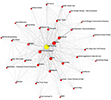Secondary Aggregators
Impact story
Impact story launched in 2011 under the label ‘Total Impact’ is a non-profit organization emerged from a hackathon. Impact story now is an open source, web based tool that aims at providing individual scientists with instruments to ‘sell their science’. The goal of its founding fathers J. Priem and H. Piwowar, who also revolutionized the community with their terminologies and concepts, is to change the reputation structures of science by widening the scope of scientific products. Impact story provides its users 5 categories for social outreach: cited, saved, discussed, viewed, and recommended. Since 2014, Impactstory is paid service.
Kudos
Kudos is a web-based service that helps researchers increase the visibility and impact of their publications since 2013. It aggregates all the most relevant metrics in one place, and maps outreach activities against those metrics. It provides a number of publication views, full-text downloads on publisher site, share referrals and Kudos views (i.e. the total number of visits to your publication page on the Kudos site). Kudos is free for individual researchers.
Plum Analytics
Plum Analytics was launched in the same year (2011) as a ‘for profit start up’ and has been set up to provide new scholarly measures. Data and measures are collected at the group level of organizations such as departments, museums, and labs. PlumAnalytics uses data of PloS ALM and is hence regarded to be a ‘secondary aggregator’. Since 2014, PlumAnalytics is part of EBSCO Information Services, a large provider of scientific information in the net. Similar to Impact Story and ALM, PlumAnalytics covers four categories of data: Usage, Captures, Mentions, Social Media, and Citations. In 2017, Plum Analytics joined Elsevier.
Webometric Analyst
Webometric Analyst is free software designed to conduct automatic web analyses of various types for social science research purposes. It gathers data from the web from different sources and processes it in many ways. One of its sources is a commercial search engine: it can submit thousands of queries per day and save the results or process them. It can create network diagrams of collections of web sites, estimate the online impact of collections of web sites or ideas, and retrieve information on a large scale about blogs and YouTube videos.








